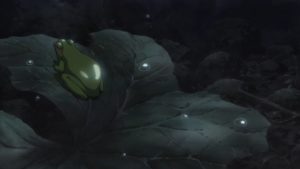 It really is unfair you know, having Dororo and Mob Psycho air not just in the middle of the week, but on the same night. These are two shows that deserve the day to themselves, but I can’t bring myself to delay covering either of them. The good side of that (aside from just having two series this good in the same season to begin with) is that there’s so little stylistic overlap between the two. Furuhashi-sensei and Tachikawa-sensei could hardly take more different approaches to stories that are starkly different to begin with. That anime can – and does – comfortably accommodate both without batting an eye is a major reason I love the medium so much – and something that those who dismiss it for superficial reasons will never understand.
It really is unfair you know, having Dororo and Mob Psycho air not just in the middle of the week, but on the same night. These are two shows that deserve the day to themselves, but I can’t bring myself to delay covering either of them. The good side of that (aside from just having two series this good in the same season to begin with) is that there’s so little stylistic overlap between the two. Furuhashi-sensei and Tachikawa-sensei could hardly take more different approaches to stories that are starkly different to begin with. That anime can – and does – comfortably accommodate both without batting an eye is a major reason I love the medium so much – and something that those who dismiss it for superficial reasons will never understand.
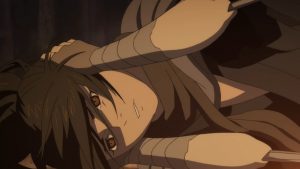 There so much quiet poetry to this series. It resides in the consistently gorgeous visuals, which tell a story of their own. And it resides in the story itself, which is where the heart of Tezuka Osamu still beats the most loudly in a show that’s changed thing quite a bit from the source material. Pathos and tragedy imbue every frame, but the genius of Tezuka is that no matter how bleak a story he’s telling, he manages to convey a fundamental belief that human compassion and love will redeem us in the end. It can be hard to believe that sometimes given what he (and Furuhashi) show us, but I think that’s rather the point. If faith of any sort were easy to achieve, it wouldn’t be necessary in the first place.
There so much quiet poetry to this series. It resides in the consistently gorgeous visuals, which tell a story of their own. And it resides in the story itself, which is where the heart of Tezuka Osamu still beats the most loudly in a show that’s changed thing quite a bit from the source material. Pathos and tragedy imbue every frame, but the genius of Tezuka is that no matter how bleak a story he’s telling, he manages to convey a fundamental belief that human compassion and love will redeem us in the end. It can be hard to believe that sometimes given what he (and Furuhashi) show us, but I think that’s rather the point. If faith of any sort were easy to achieve, it wouldn’t be necessary in the first place.
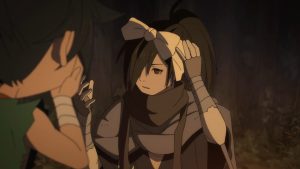 Poor Hyakkimaru has finally got his hearing back, but it’s been a hard road from the very first moments, when Osushi’s wails of grief were his introduction to the world of sound. Now it’a all proving too much for him – an unstoppable avalanche of sensory input he can’t escape. Dororo does his best to help, but maybe the fact that he’s such a little chatterbox isn’t such a good thing here. Hyakkimaru’s new hearing throws him off even in battle, which costs him in a scrap with a relatively weak bird youkai – with Dororo’s shouted commands he manages to wound the beast but is wounded himself in the process, and it’s only Biwamaru’s timely arrival (I believe the timely part not to be a coincidence) that saves the day.
Poor Hyakkimaru has finally got his hearing back, but it’s been a hard road from the very first moments, when Osushi’s wails of grief were his introduction to the world of sound. Now it’a all proving too much for him – an unstoppable avalanche of sensory input he can’t escape. Dororo does his best to help, but maybe the fact that he’s such a little chatterbox isn’t such a good thing here. Hyakkimaru’s new hearing throws him off even in battle, which costs him in a scrap with a relatively weak bird youkai – with Dororo’s shouted commands he manages to wound the beast but is wounded himself in the process, and it’s only Biwamaru’s timely arrival (I believe the timely part not to be a coincidence) that saves the day.
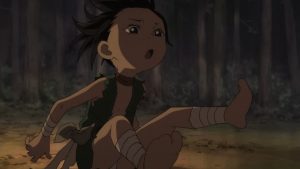 Another war is brewing, as one of Daigo’s retainers has betrayed him (part of the flood of bad luck suddenly befalling his lands). As Hyakkimaru is recovering from his injuries, weak and feverish, his world is changed by the sound of another woman’s voice – but this is totally different from before. A young woman named Mio (Mizuki Nana, whose voice could make anyone glad they can hear) is singing as she washes herself in the river, and Hyakkimaru is awestruck. Alarmed at his state, she takes him (along with Dororo and the old priest) back to the ruined temple where she lives along with a group of war orphans she cares for, chief among them one of the older boys, Takebou (Terasaki Yuka).
Another war is brewing, as one of Daigo’s retainers has betrayed him (part of the flood of bad luck suddenly befalling his lands). As Hyakkimaru is recovering from his injuries, weak and feverish, his world is changed by the sound of another woman’s voice – but this is totally different from before. A young woman named Mio (Mizuki Nana, whose voice could make anyone glad they can hear) is singing as she washes herself in the river, and Hyakkimaru is awestruck. Alarmed at his state, she takes him (along with Dororo and the old priest) back to the ruined temple where she lives along with a group of war orphans she cares for, chief among them one of the older boys, Takebou (Terasaki Yuka).
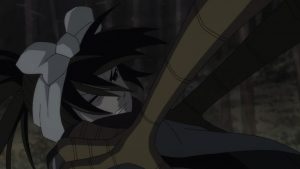 Say this for both Tezuka and Furuhashi, they sure as hell don’t romanticize what life was like during the Warring States Period. It was indeed hell, and as Sartre said, “Hell is other people”. It’s not the ayakashi and bakemono causing misery in this world, it’s humans. Needlessly cruel samurai chopping the arms off little boys to test their blades, warlords playing dice with the lives of their people by engaging in endless conflicts, and yes – weak men selling their sons to demons for wealth and power. Yet against this backdrop is always empathy, courage and quiet dignity. It’s hard-pressed to survive and remain itself, but we see evidence of it in every episode.
Say this for both Tezuka and Furuhashi, they sure as hell don’t romanticize what life was like during the Warring States Period. It was indeed hell, and as Sartre said, “Hell is other people”. It’s not the ayakashi and bakemono causing misery in this world, it’s humans. Needlessly cruel samurai chopping the arms off little boys to test their blades, warlords playing dice with the lives of their people by engaging in endless conflicts, and yes – weak men selling their sons to demons for wealth and power. Yet against this backdrop is always empathy, courage and quiet dignity. It’s hard-pressed to survive and remain itself, but we see evidence of it in every episode.
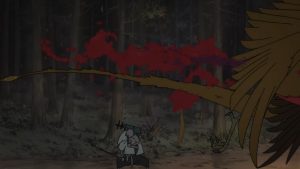 There’s not much mystery about what the mysterious work Mio can do only at night is, though it certainly comes as a considerable shock to Dororo when he sees first-hand the nature of it. Dororo is no innocent and surely knows what he’s looking at, even if he’s too much a child to really understand it. Another of those now-expected moments of Dororo beautiful sadness comes when Dororo tells Mio that Hyakkimaru can “see” the color of people’s souls – she covers herself up, convinced what he would see in her is the blackness of what she’s forced to do. But Hyakkimaru’s vision is true vision, and all he sees in Mio’s soul is the reason she sacrifices so much of herself, and the nobility that drives her to do it.
There’s not much mystery about what the mysterious work Mio can do only at night is, though it certainly comes as a considerable shock to Dororo when he sees first-hand the nature of it. Dororo is no innocent and surely knows what he’s looking at, even if he’s too much a child to really understand it. Another of those now-expected moments of Dororo beautiful sadness comes when Dororo tells Mio that Hyakkimaru can “see” the color of people’s souls – she covers herself up, convinced what he would see in her is the blackness of what she’s forced to do. But Hyakkimaru’s vision is true vision, and all he sees in Mio’s soul is the reason she sacrifices so much of herself, and the nobility that drives her to do it.
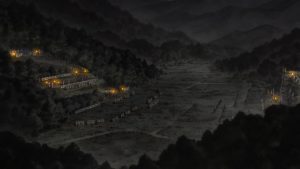 Speaking of pathos, what a cruel irony it is that befalls Hyakkimaru when he goes off to defeat the youkai which has taken residence in the plot of land Biwamaru has found where the orphans can safely ride out the war. Hyakkmiaru isn’t doing this to regain a part of his body – this was not one of the demons on his hit list. He’s doing it for Mio and the children, because he’s grateful for the gift her voice has given to him (and maybe other reasons too). Hyakkimaru isn’t fully recovered yet, and even with Biwamaru’s help the youkai (something like a giant ant lion) is a powerful foe. In the course of battle Hyakkimaru loses a leg – the very leg he’s only just regained – and understands the agony one risks when they possess a physical body.
Speaking of pathos, what a cruel irony it is that befalls Hyakkimaru when he goes off to defeat the youkai which has taken residence in the plot of land Biwamaru has found where the orphans can safely ride out the war. Hyakkmiaru isn’t doing this to regain a part of his body – this was not one of the demons on his hit list. He’s doing it for Mio and the children, because he’s grateful for the gift her voice has given to him (and maybe other reasons too). Hyakkimaru isn’t fully recovered yet, and even with Biwamaru’s help the youkai (something like a giant ant lion) is a powerful foe. In the course of battle Hyakkimaru loses a leg – the very leg he’s only just regained – and understands the agony one risks when they possess a physical body.
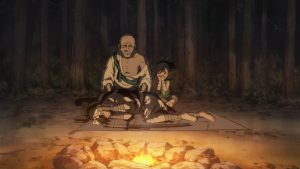 Something else happens here too – we hear Hyakkimaru’s voice (Suzuki Hiroki) for the first time. His first exposure to sound was a woman’s anguish, and his first creation of it is his own – what a tragic existence this poor boy has been forced to endure. Hyakkimaru has literally been cursed in the worst way imaginable – by his own father no less – but now he’s also been blessed with loyal friends (and Junkai is still out there somewhere thinking about him, which may be more relevant now than ever). Cruelty and savagery exist arm-in-arm with decency and empathy in this world Tezuka has created – but does justice? Only time will answer that question.
Something else happens here too – we hear Hyakkimaru’s voice (Suzuki Hiroki) for the first time. His first exposure to sound was a woman’s anguish, and his first creation of it is his own – what a tragic existence this poor boy has been forced to endure. Hyakkimaru has literally been cursed in the worst way imaginable – by his own father no less – but now he’s also been blessed with loyal friends (and Junkai is still out there somewhere thinking about him, which may be more relevant now than ever). Cruelty and savagery exist arm-in-arm with decency and empathy in this world Tezuka has created – but does justice? Only time will answer that question.


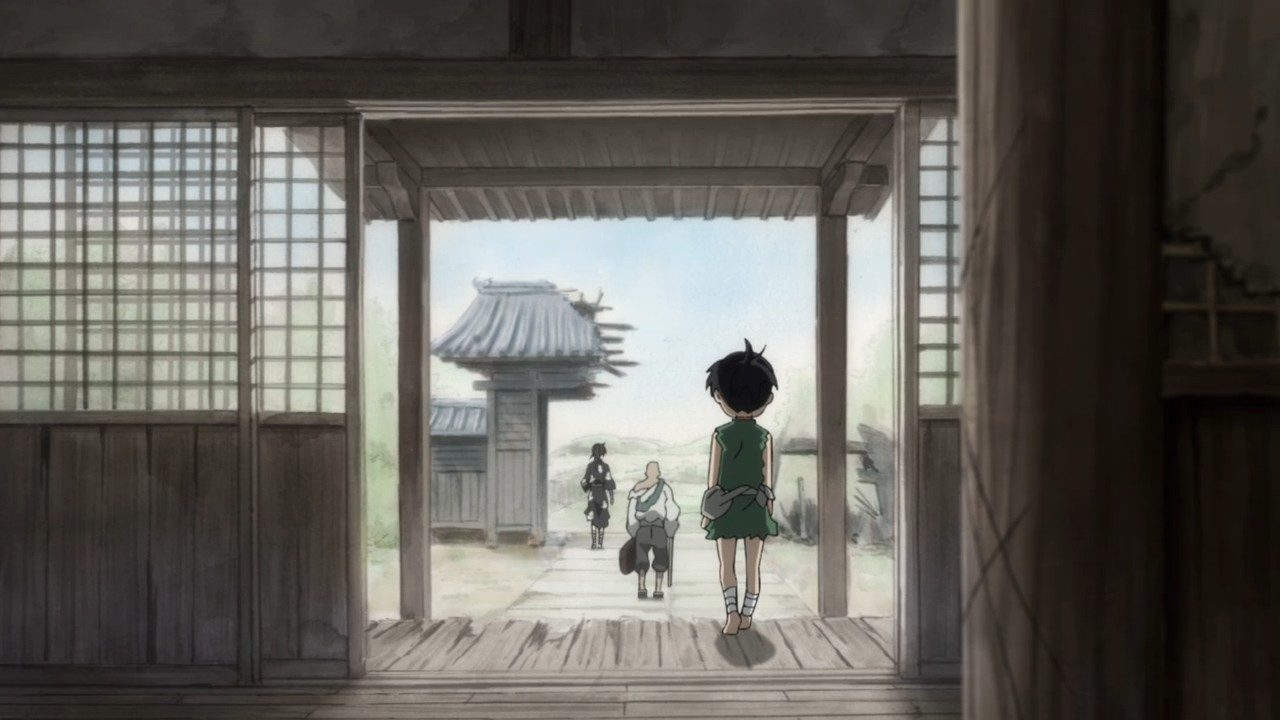
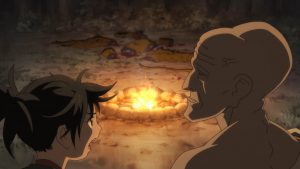
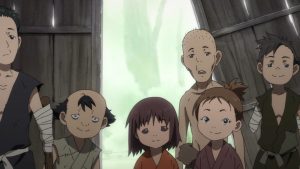
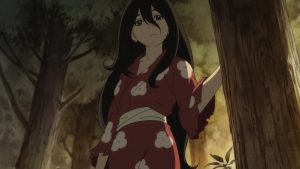
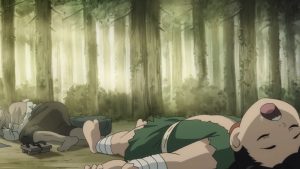
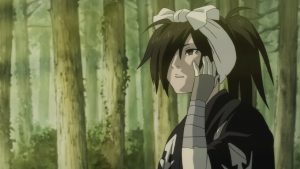
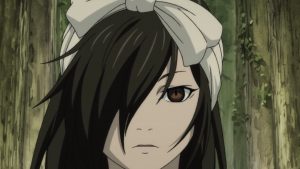
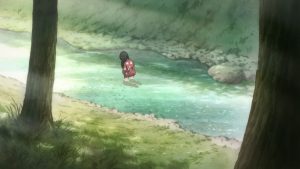
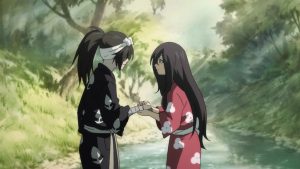
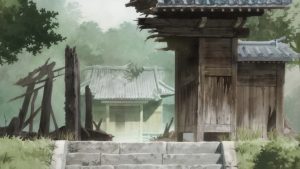
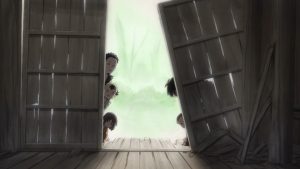
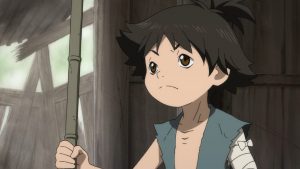
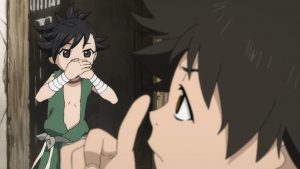
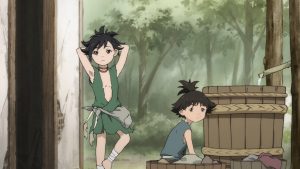
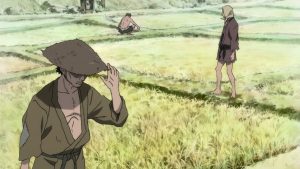
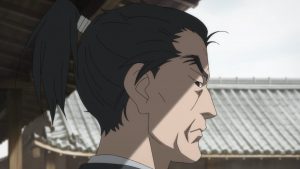
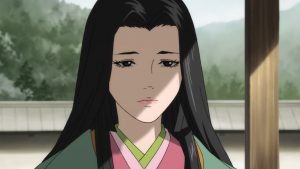
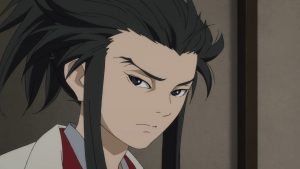
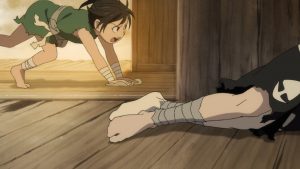

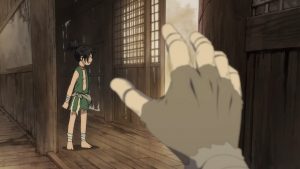

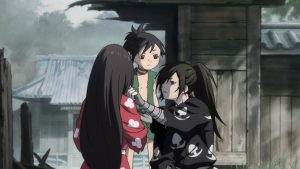
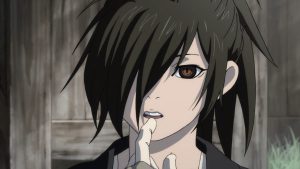
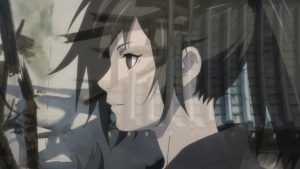
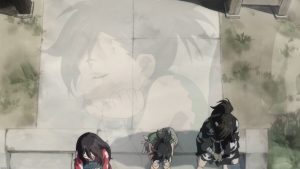
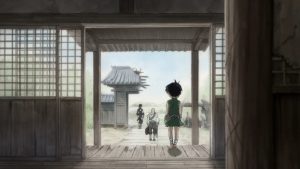
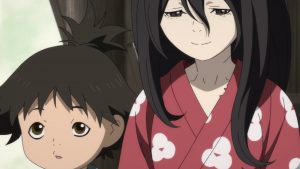
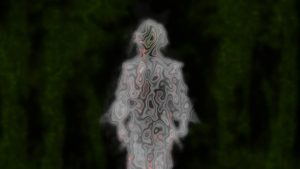
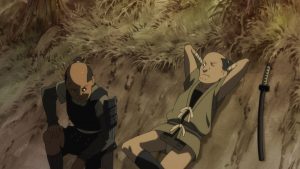
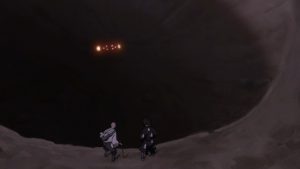
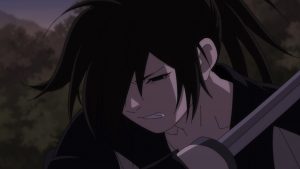
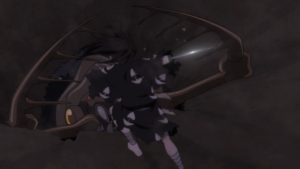
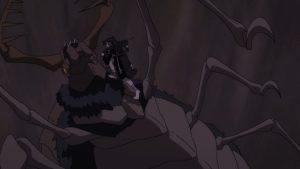
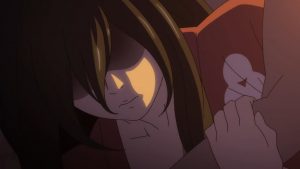

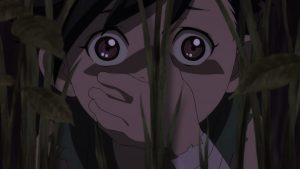
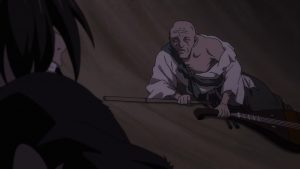

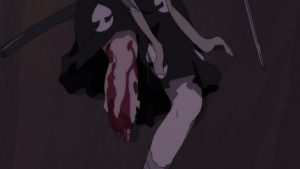


Gracie
February 5, 2019 at 9:14 pmI have a bad feeling about Mio and the kids.
Dawn
February 6, 2019 at 9:38 amThey couldn’t be more subtle about it.
hgfdsahjkl
February 5, 2019 at 9:14 pmprops to Mappa ((the new madhouse for me)) for keeping the animation quality ,the fight at start was great
whoever picked this up from under the dust is the true hero,a very brilliant idea by tezuka presented and explored in good hands
Guardian Enzo
February 5, 2019 at 10:09 pmGiven Maruyama’s love for Tezuka, I wouldn’t be surprised if he laid the groundwork for this project before he left the studio.
sonicsenryaku
February 6, 2019 at 2:56 pmIt’s a shame what happened to the initial visual concept of show; man would that have been impressive to see. That being said, why isn’t this show on adult swim? It the perfect melancholic tone that used to be characteristic of the anime that aired on adultswim in the early 2000’s. Funnily enough, if you needed an indication of the change that has ripped through the anime industry over the years, just compare adult swim’s anime line up in the early 2000’s to what it is now
Guardian Enzo
February 6, 2019 at 4:00 pmI think it’s very possible this will end up on Adult Swim. I agree, it’s timeless and a great fit.
Yukie
February 5, 2019 at 9:55 pmSince episode 3, Dororo has completely blown my expectations out of the water. This has turned out to be a darker and more mature series than I had anticipated. I’d thought the story would run along the lines of episode 2 (ayakashi-of-the-week) but now it seems more like the-horrors-of-war/week. I’d been bracing myself for some depressing events in Mob Psycho 100 (due to the warning from manga readers), but the last few minutes of this episode left me more in shock. I knew what Mio’s night job was but was not expecting them to show it so blatantly (from the invitation to Dororo’s witnessing), and then to overlap it with Hyakkimaru’s fight and his suffering in the last few moments was honestly cinematically brilliant and terribly brutal.
I am not ready for the despair next week brings (all those flags). Also are the hints of red in Hyakkimaru’s soul killing intent? Or is it something else, since he also had some red mixed with white as an infant?
Kurik
February 5, 2019 at 9:55 pmAnother great episode and review Enzo…I would also pay keen attention to the what the priest said in that Hyakkimaru needs to be watched as he follows him and sees the colour of his soul shimmer with red….He does seem to have the potential to go bad I think with potentially Dororo pulling him back in the end. This, indeed, is a cruel world. Was hard to watch Mio….
Marty
February 6, 2019 at 4:09 amWow, the modern art style may betray the fact this is an old manga, but it’s kinda crazy to think the seemingly cartoonish and innocent-looking art style of the original manga told such a dark story, talk about not judging a book by its cover.
Only thing that kinda bothered me about this episode is that if Hyakkimaru has been deaf his whole life, how does he understand the spoken language? I understand he can be taught writing, but without a nervous system, which he just recently gained, he can’t even “feel” the sound of words.
Guardian Enzo
February 6, 2019 at 7:36 amThat’s an interesting question. Is it clear that he is understanding words, or is he reacting to the emotions behind them?
Earthlingzing
February 8, 2019 at 11:22 pmI thought this episode looked especially good. Those backgrounds, oh my.
Nadavu
February 25, 2019 at 3:14 amI’m catching up after a month of no anime (RL sucks), but I just had to comment on how ridiculously good and horrible this episode was. What really got to me is that when Mio is first shown washing in the river, it looks like she’s focusing on a particular body part. At first I thought this was either coincidental or some tongue-in-cheek humor on behalf of the animators, but as the last scene played out it all came together in a gruesome, soul-crushing, mind-blowing, circle-completing, big-bang of a conclusion. The people making this show have absolutely no consideration of my feelings. Brilliant.